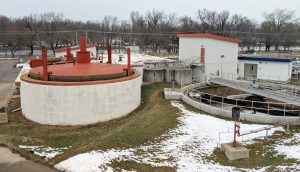Increase will help fund $4 million digester upgrade
By Scott Bellile
City of New London utilities customers will pay an extra $1 per month for sewer services starting in 2019.
The New London City Council on Dec. 11 voted 8-1 to pass an ordinance amendment that raises the base monthly fixed sewer meter rate from $3 to $4.
Second District Alderman Tom O’Connell voted no. Third District Alderwoman Lori Dean did not attend the meeting.
No residents spoke during a public hearing on the proposed fixed rate increase, and the city council passed the amended ordinance without discussion.
Reasons for rate increase
The New London Board of Public Works recommended the fixed rate increase to the city council in November based on a recent audit.
At the board’s Nov. 5 meeting, Kyle Bennwitz of Baker Tilly presented the results of a sewer rate study that concluded the city should raise the rate.
The current fixed rate does not provide enough operating revenue for the New London Wastewater Treatment Plant.
According to the study, the plant is 0.3 percent short of the revenue needed to operate and maintain the plant.
“So one of the reasons that we’re looking at increasing this [fixed rate] is to get us into the positive,” City Finance Director Judy Radke said.
Radke said the rate increase will also fund several upcoming expenditures:
• The Public Works Department plans to increase its 2019 budget for televising city sewer laterals fivefold, from $2,000 to $10,000, Radke said.
Televising is the process of feeding a camera through a manhole and into underground sewer pipes to inspect the conditions of pipes.
• The city will double how much money it sets aside for replacing underground sewer mains and sewer laterals, Radke said.
This is in response to an increase in street repair projects using municipal wheel tax dollars.
Private property owners ultimately pay for their sewer lateral replacements. But to reduce the burden on property owners, the city of New London foots the upfront cost and offers residents loans.
• Maintaining a solid fixed sewer rate will also make the New London Wastewater Treatment Plant appear more favorable to lenders when it borrows money for a proposed $4.5 million upgrade to the plant’s digester complex and waste receiving station.
Third rate increase since 2016
The city council’s decision means the base monthly fixed charge will increase for the third time in just over two years.
The fixed rate rose from 80 cents to $2.30 in October 2016, then $2.30 to $3 in November 2017, and now $3 to $4 in January 2019.
“We would not be looking at another increase for the next three years,” Radke said, referring to when the city’s next sewer rate study will be completed.
Radke said citizens respond better to gradual rate increases over time than to infrequent but steep increases.
The last two increases in 2016 and 2017 also raised utilities customers’ volume charge per 1,000 gallons of water used.
However, this increase will not change the volume charge. The volume charge will remain $9.34 per 1,000 gallons for metered users and $33.97 per month for unmetered users.
Digester upgrade planned

Scott Bellile photo
At the Dec. 3 meeting of the board of public works, Ben Greuel, chief operator of the New London Wastewater Treatment Plant, said the recent rate increases will help fund a proposed upgrade to the digester complex and waste receiving station.
At that meeting, the board authorized New London Public Services Director Chad Hoerth to advertise bids for a contractor to complete the project.
Eric Lynne, wastewater engineer for the Sheboygan-based firm Donohue & Associates, said the estimated $4.5 million project could begin in summer 2019 and wrap up before 2020.
The wastewater treatment plant was built in 1954. The facility, including the digesters, was upgraded in 1988 to handle more waste capacity.
The digesters’ main issue is they are leaking, Lynne said.
“There’s some sludge basically coming through the wall,” Lynne said. “You know, it’s over a foot thick, the concrete, and somehow [sludge is] getting through all that stuff.”
Greuel said the heat exchanger, which is intended to heat sludge to the optimal temperature of 98 degrees Fahrenheit, barely hits 94 degrees.
Other problems the digesters are experiencing include corroded steel piping and appliance failures. Replacing broken parts is time-consuming because wastewater treatment plants are custom-designed for a community’s needs, according to Greuel.
The digester building is not built to today’s standards or fire codes. A methane gas leak met with a spark could cause an explosion, Greuel said.
Hoerth said the digester upgrade is “the dire need” right now. The proposed high-strength waste receiving station will not be built if the bids are too high.
The proposed receiving station would generate additional revenue for the city by accepting high-strength wastes including cheese, grease traps and septic from paying haulers, thereby lessening rate increases in the future, Greuel said.
The receiving station would also improve the odors in the air, Greuel said.
How New London’s sewer bill will compare to other cities
The average New London resident’s sewer utility bill in 2019 will be in the middle range compared to Wisconsin communities with similar customer bases and commercial industry.
According to Baker Tilly’s report, the average monthly bill in each community, including both the monthly fixed rate and the volume charge for metered customers, is projected to be:
• Ripon: $28.73.
• Jackson: $31.11.
• Delafield: $31.14.
• New London: $32.17.
• Columbus: $32.74.
• Waupaca: $35.34.
• Clintonville: $38.87.
• Mount Horeb: $50.24.
